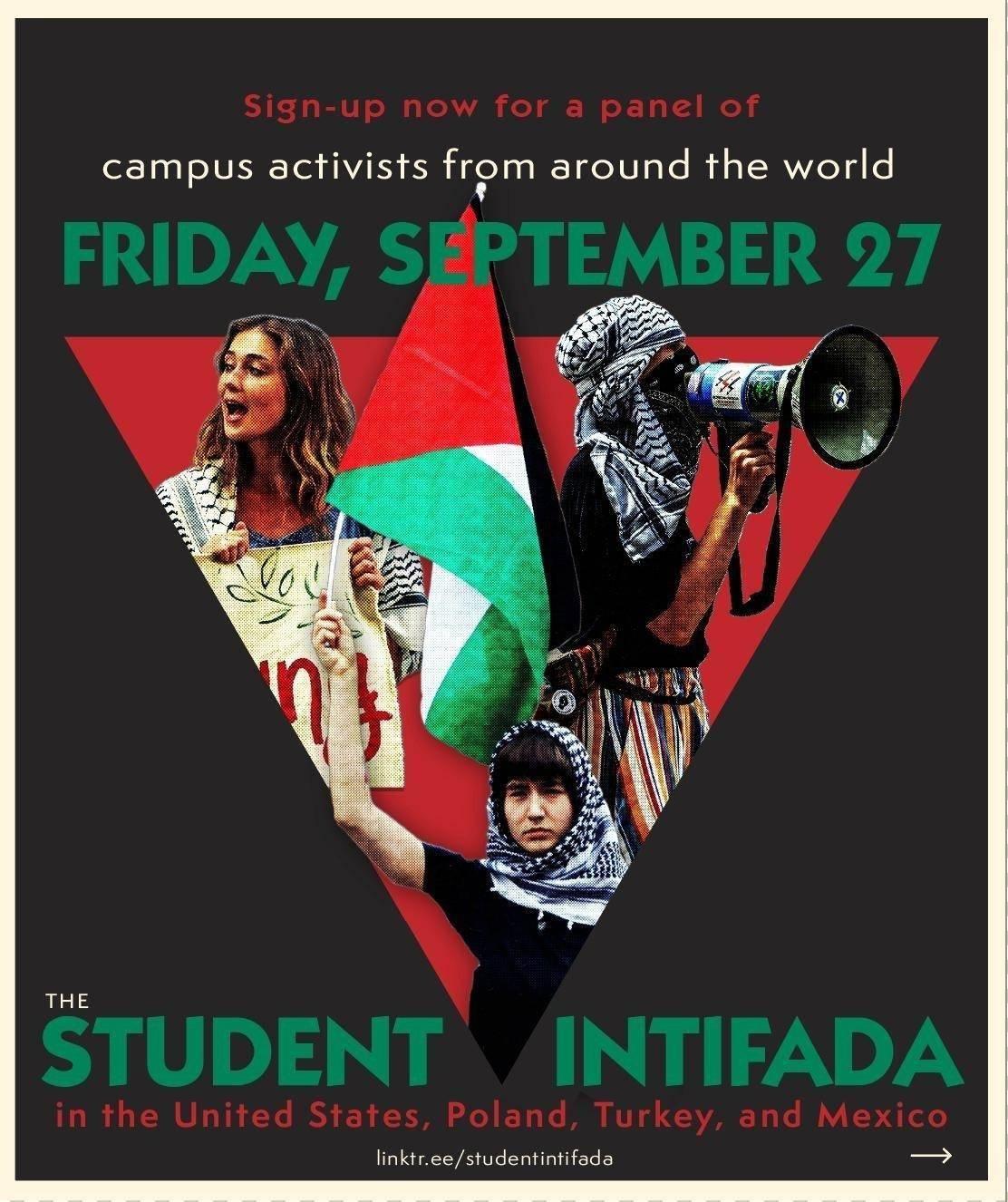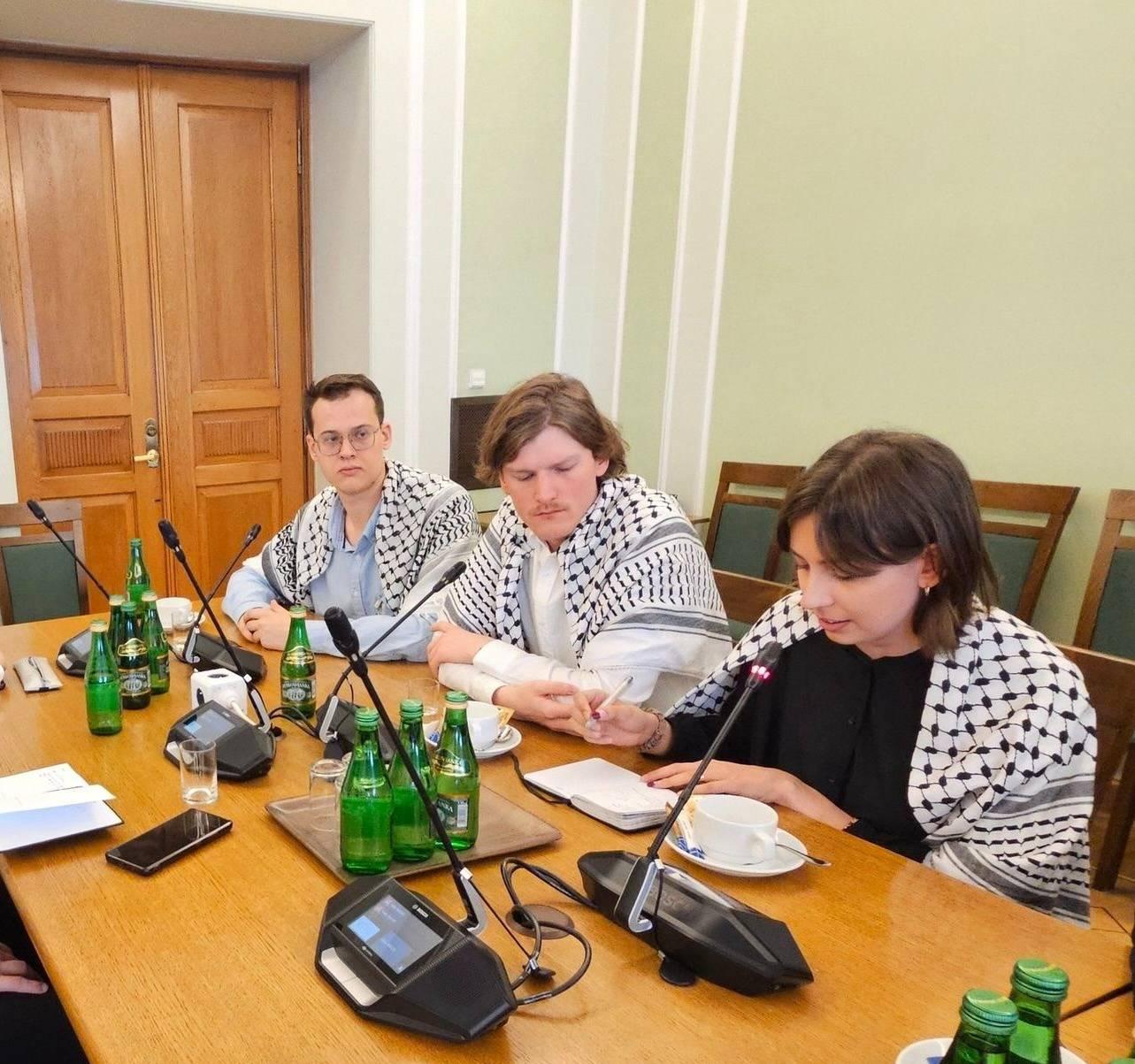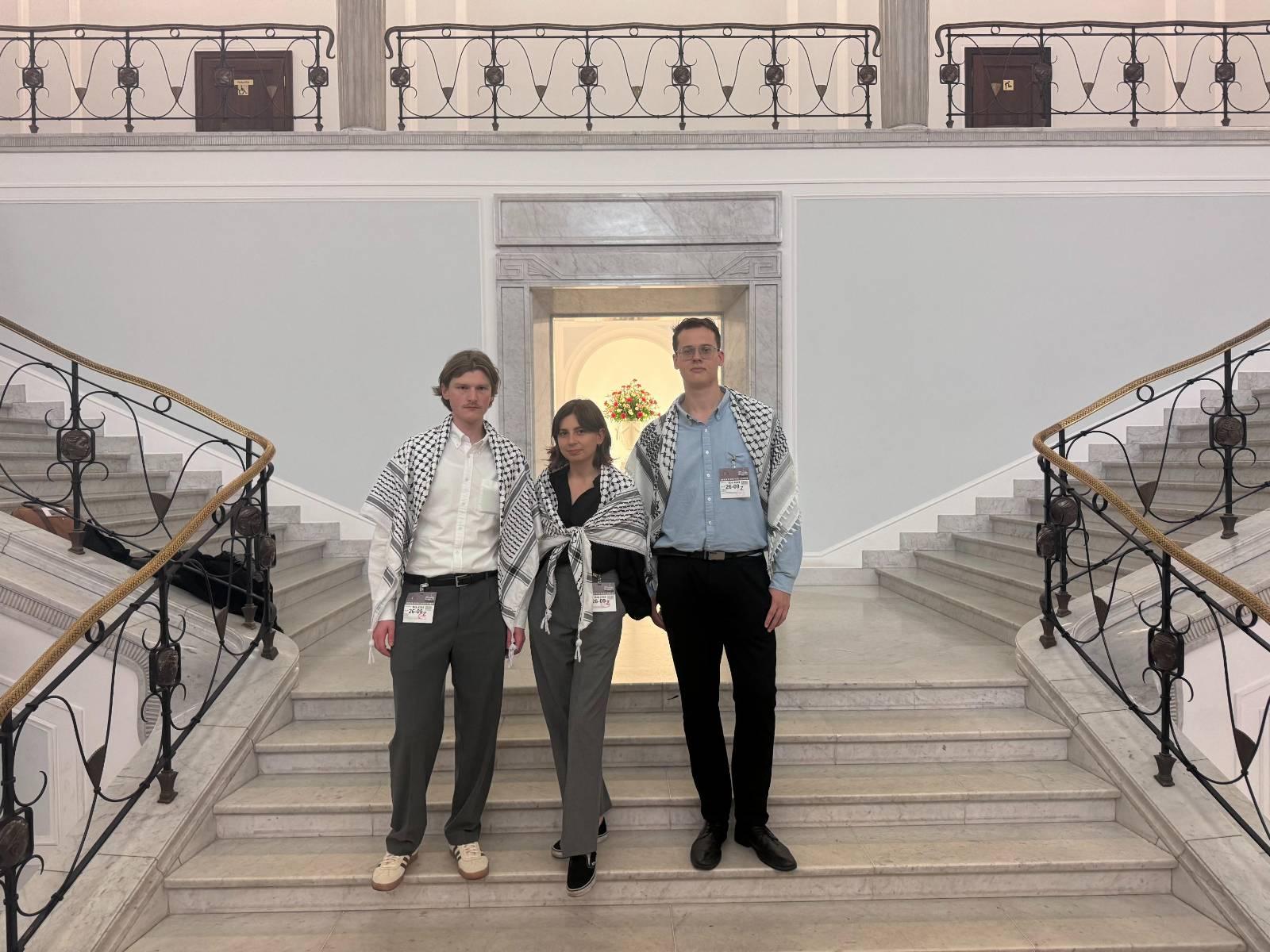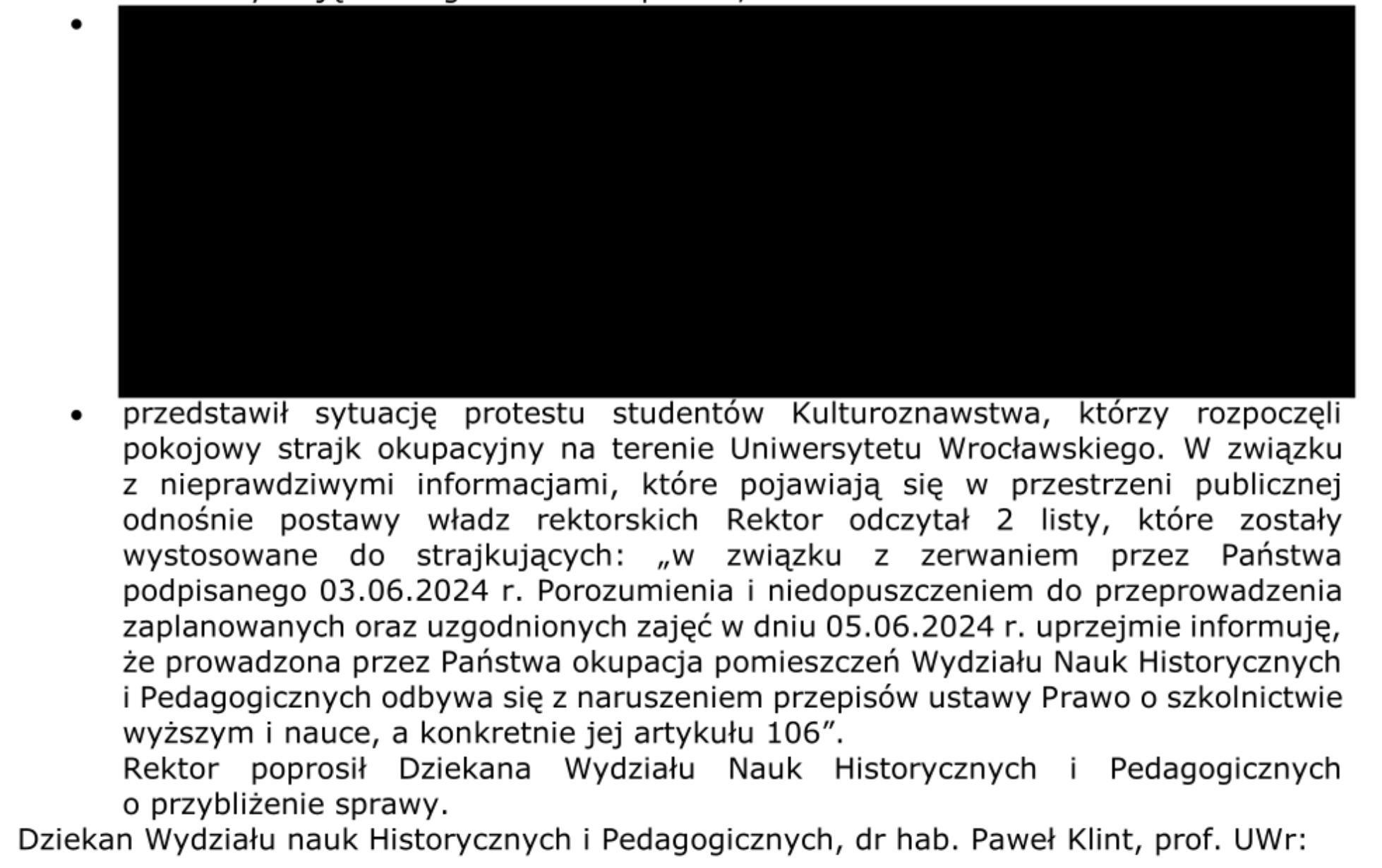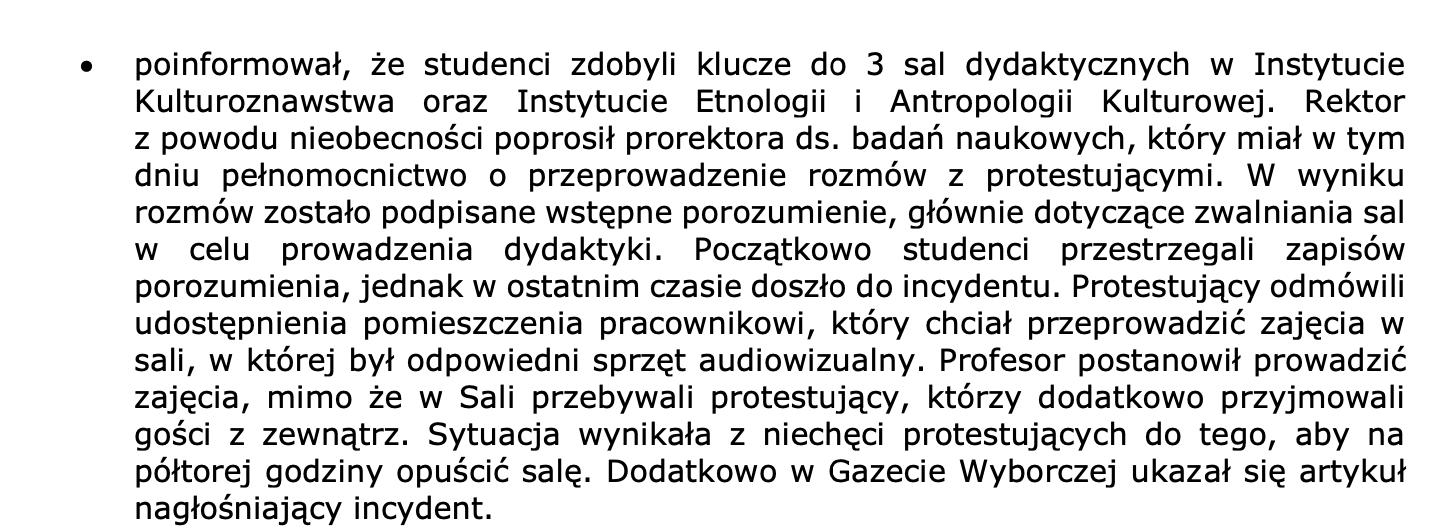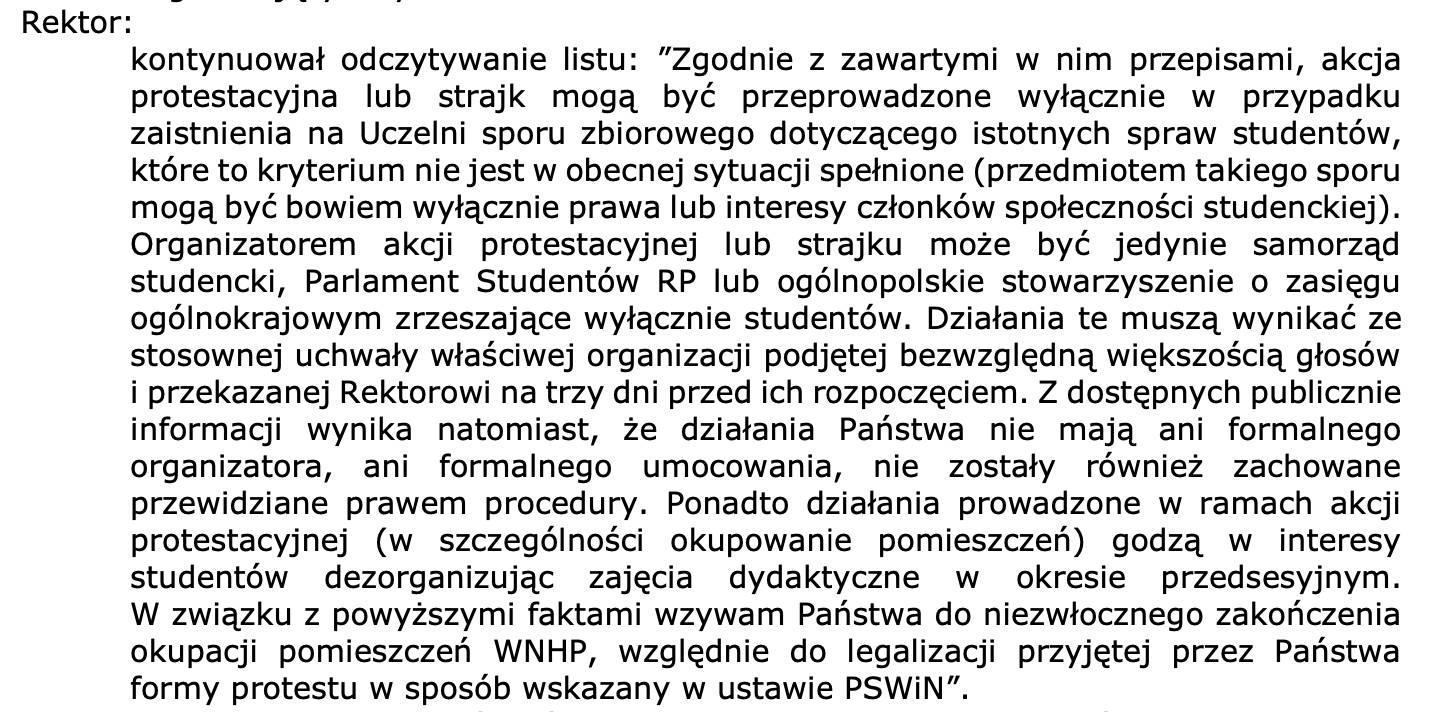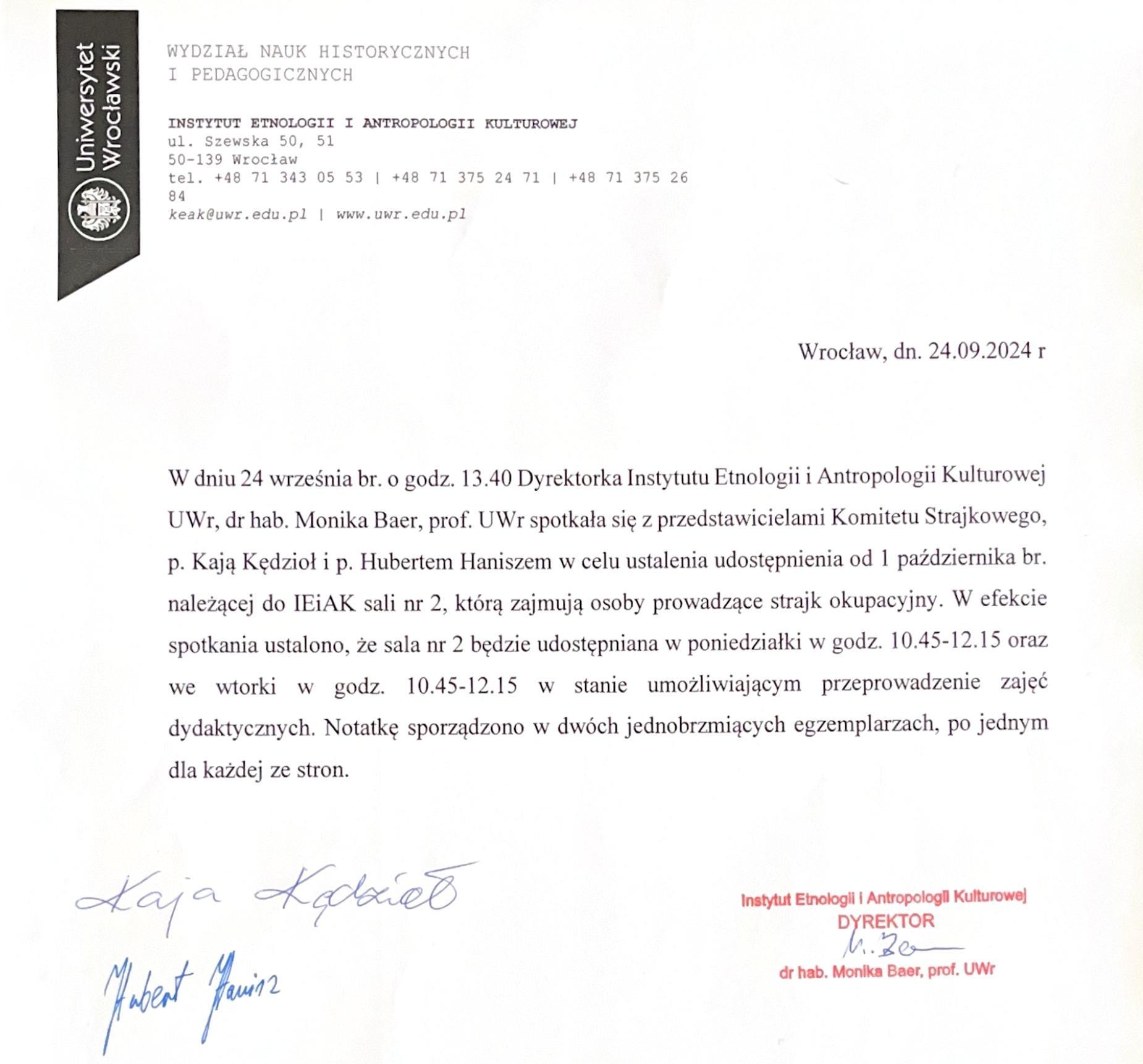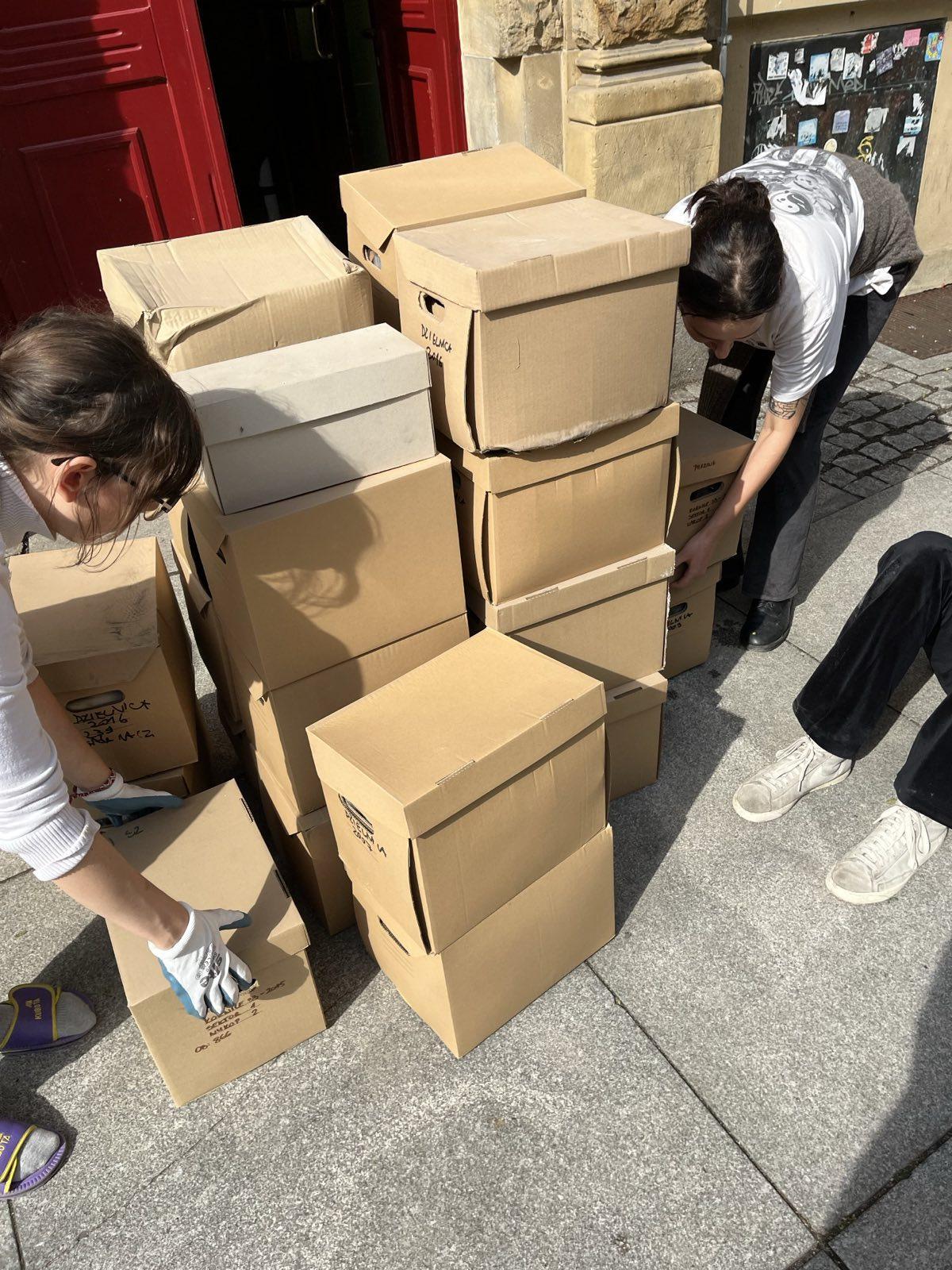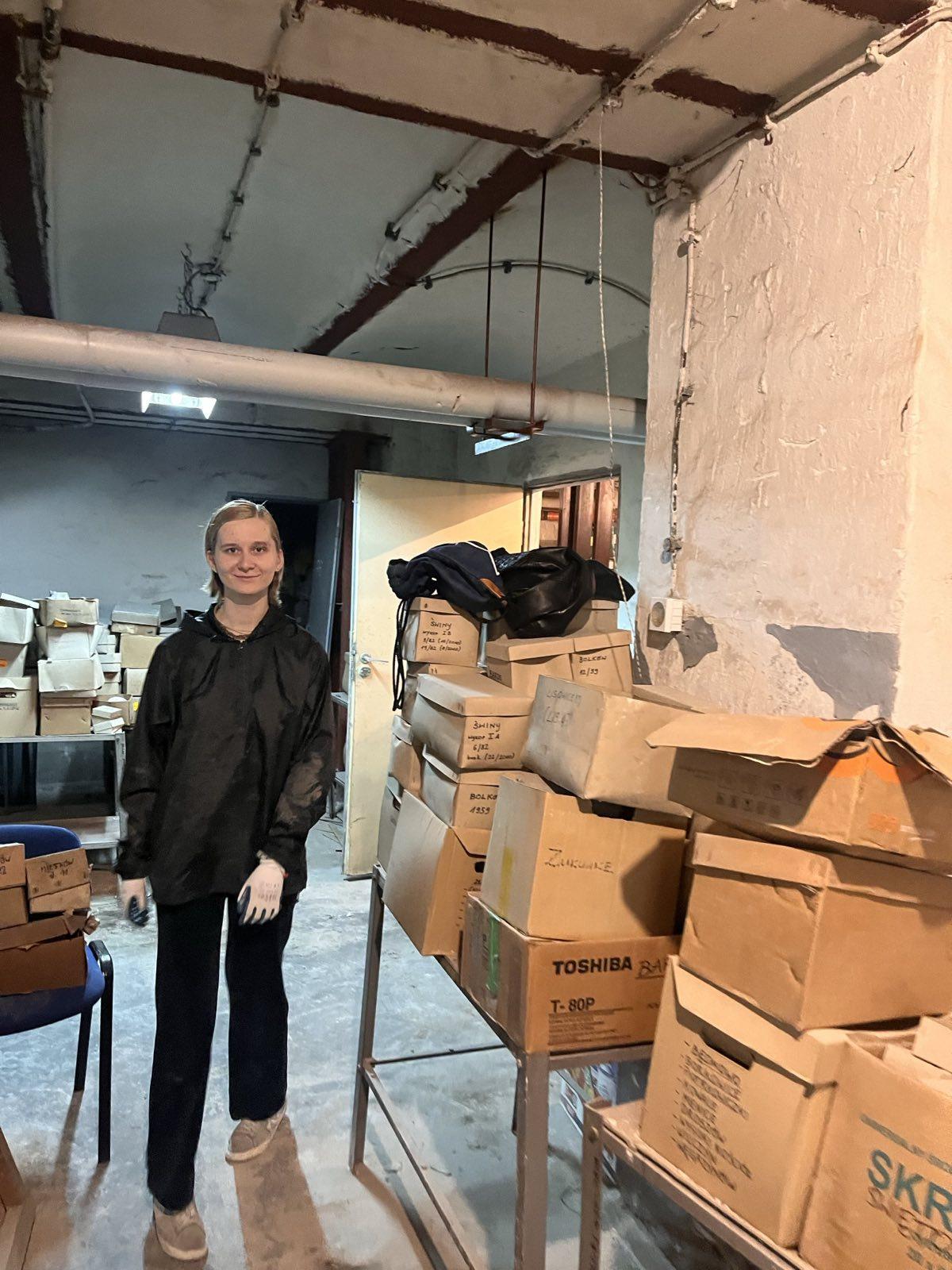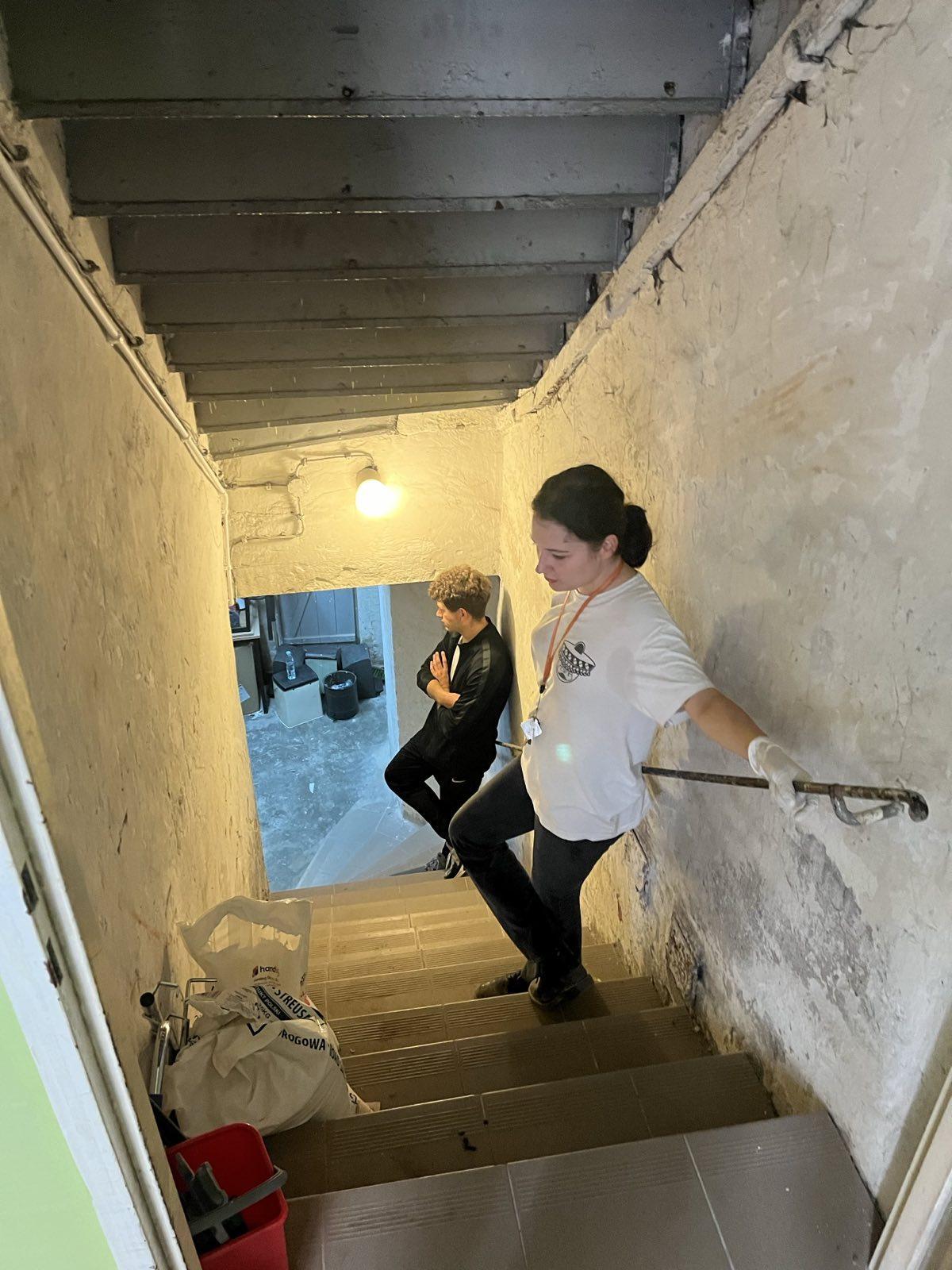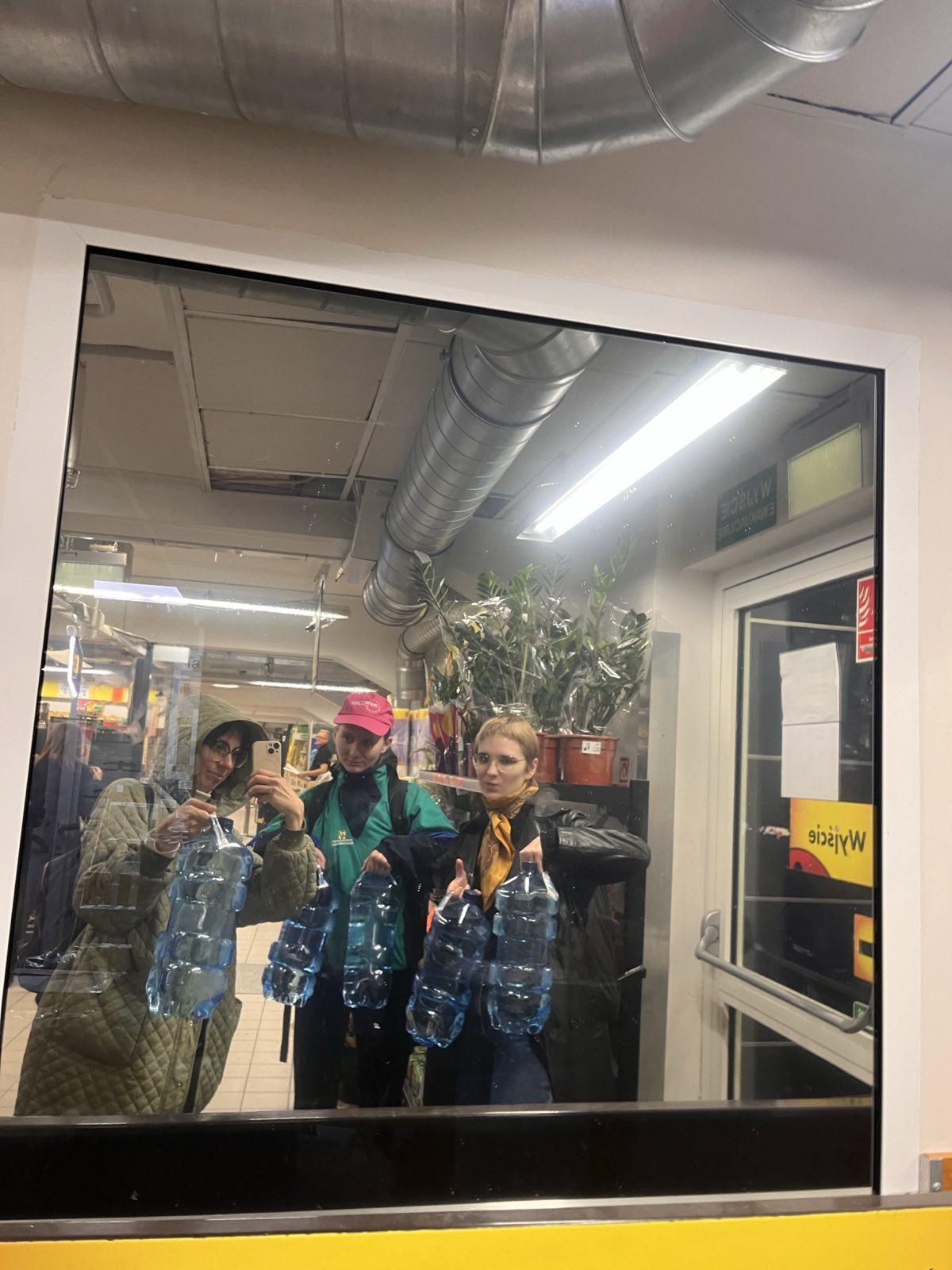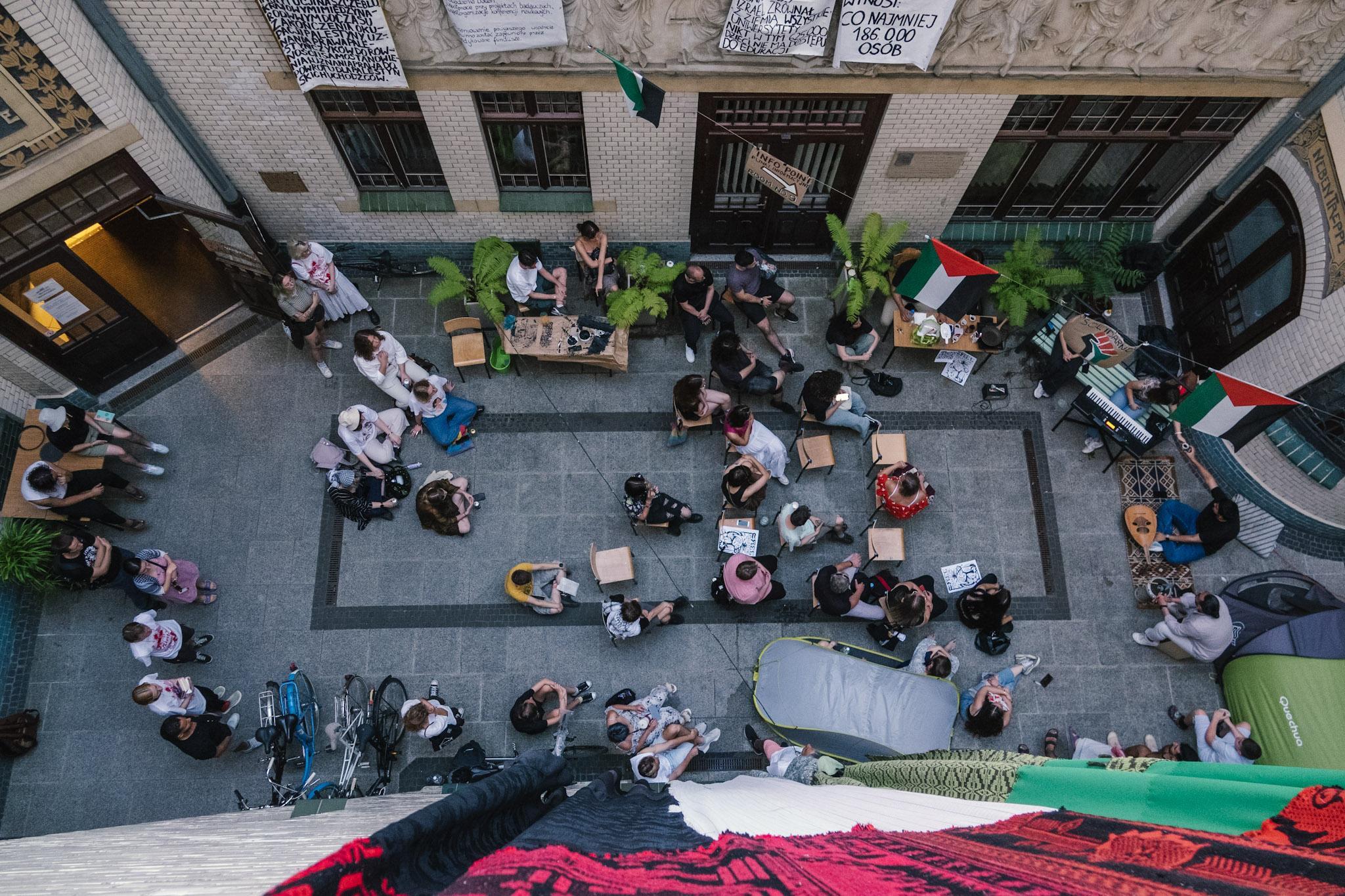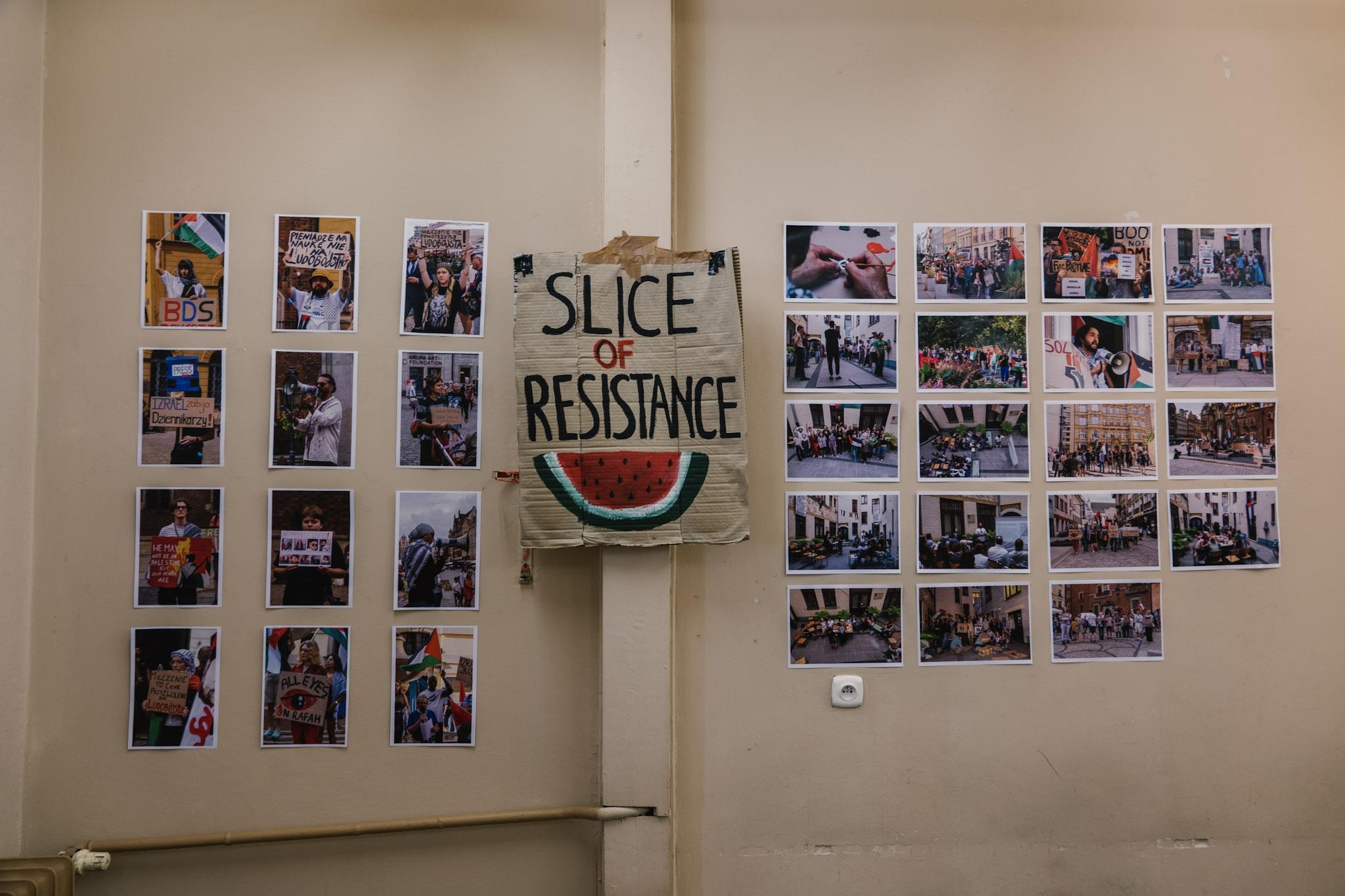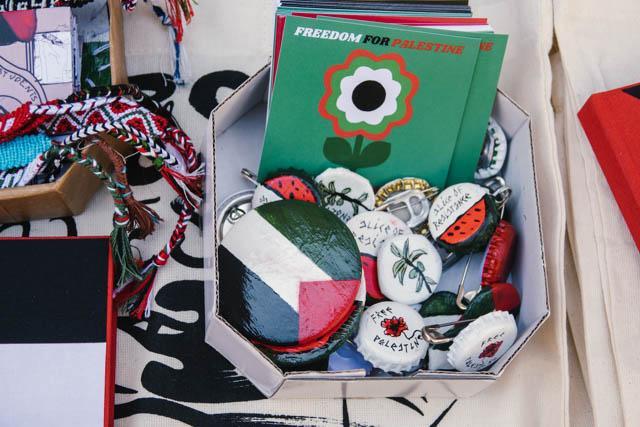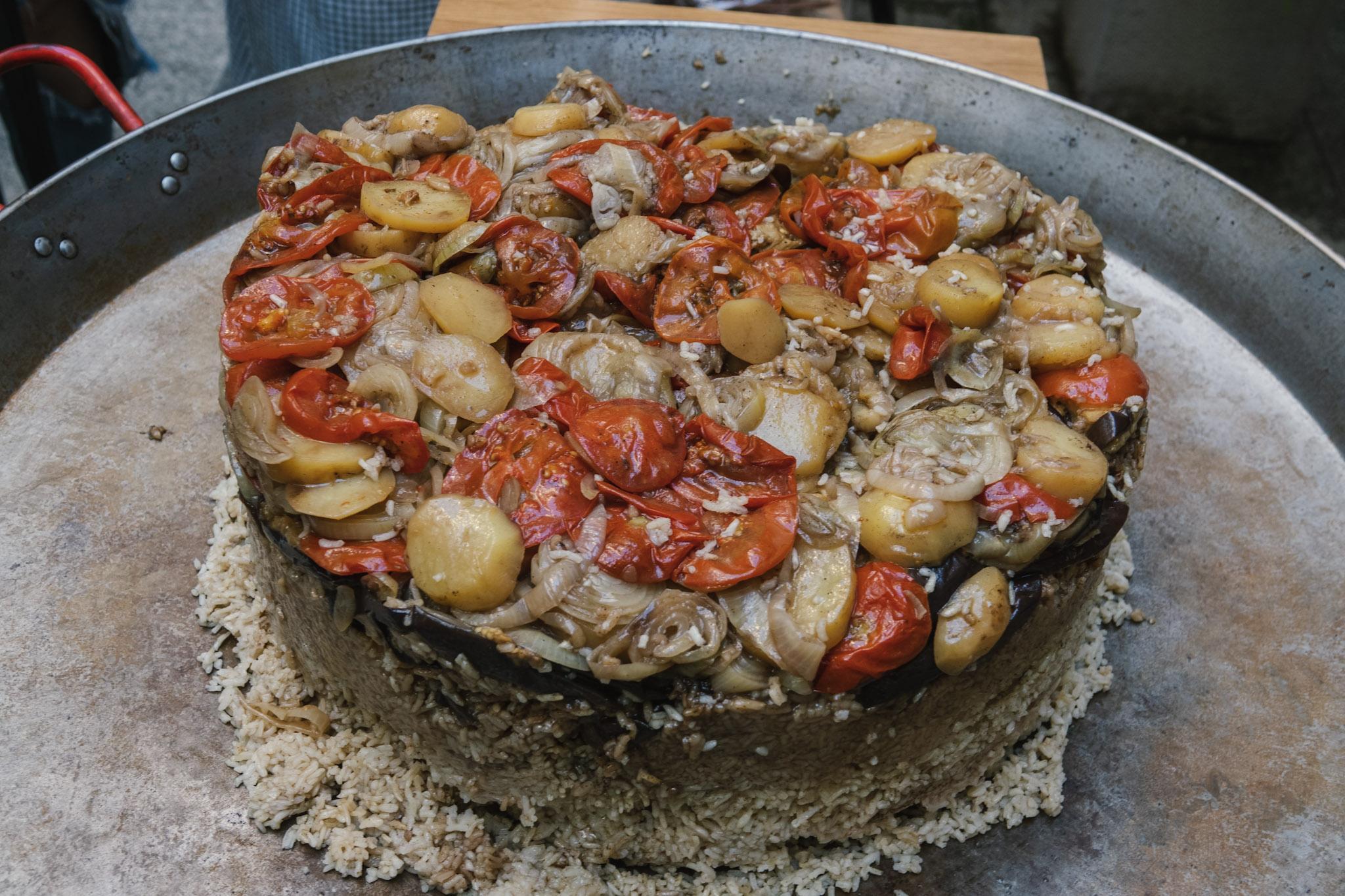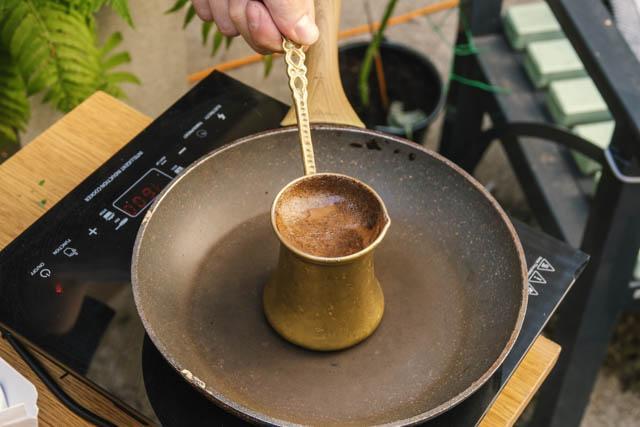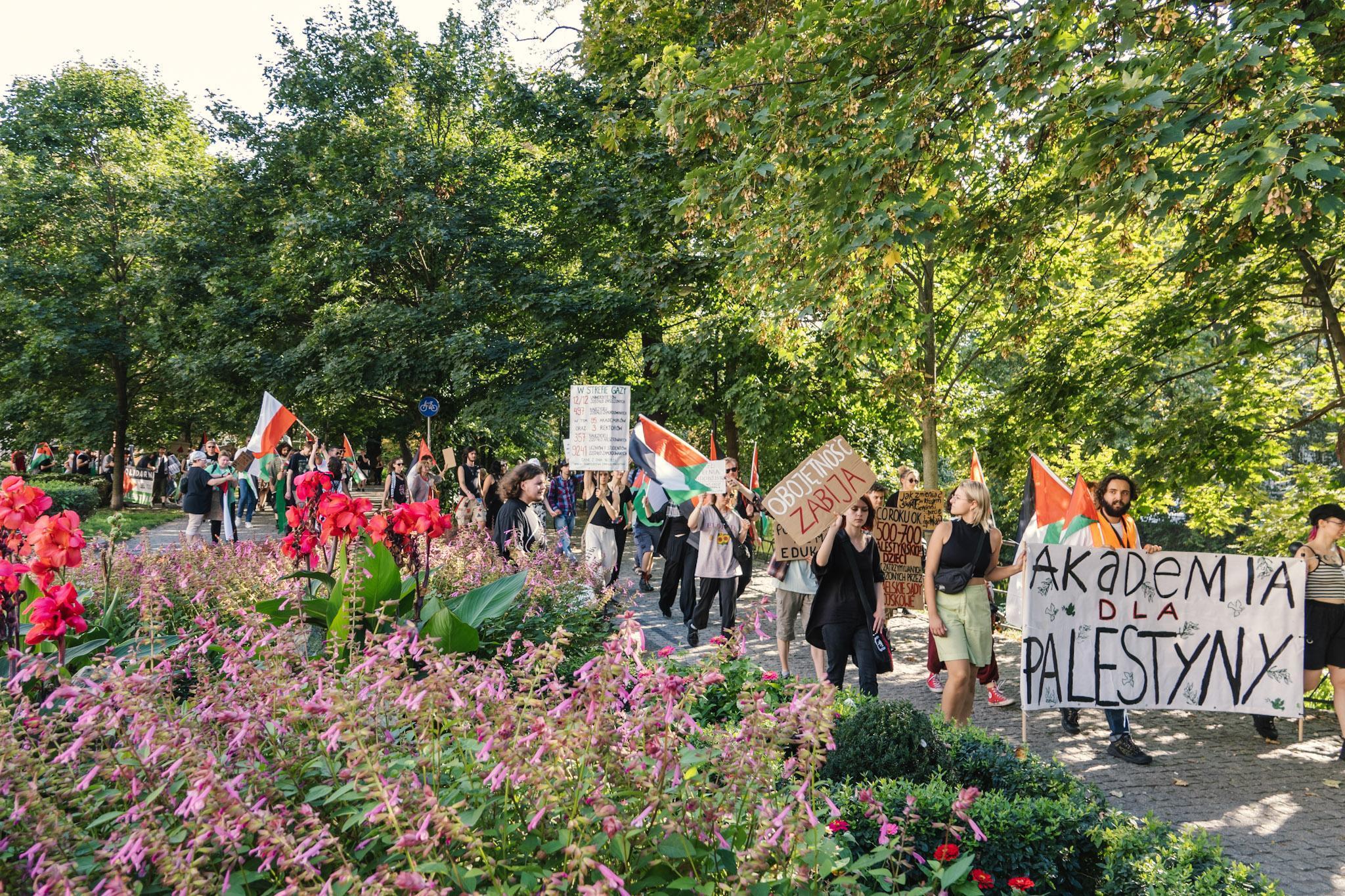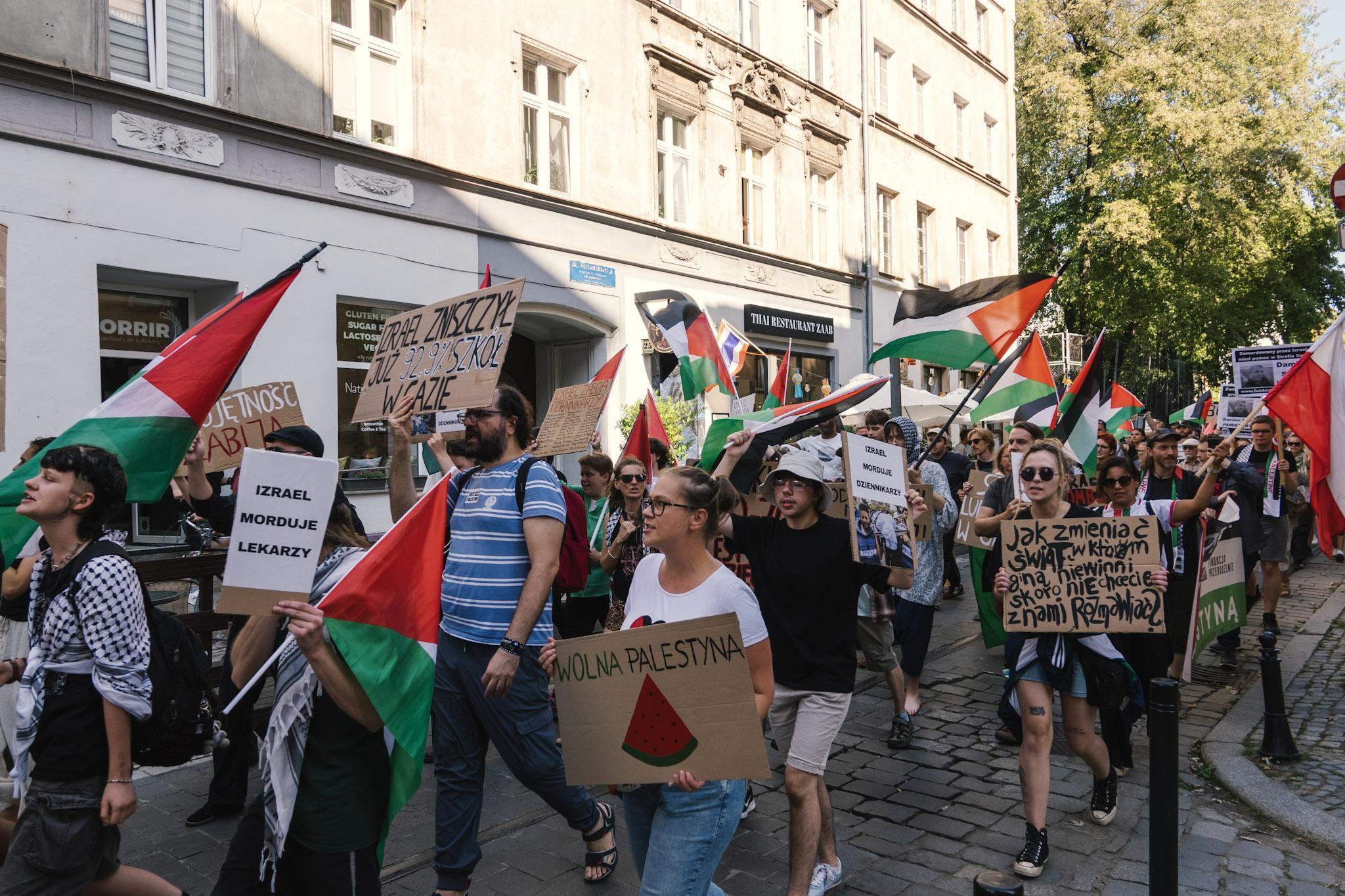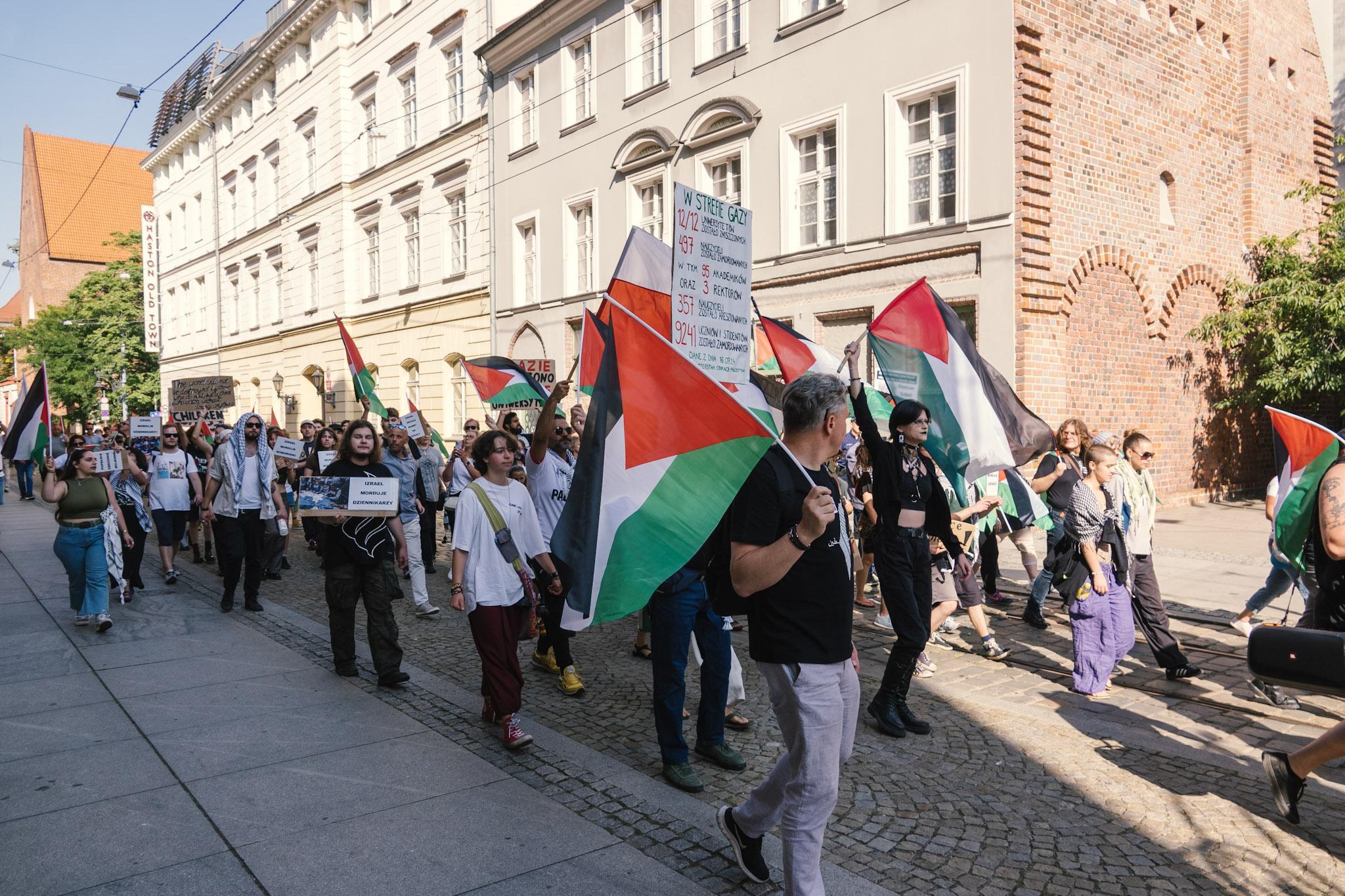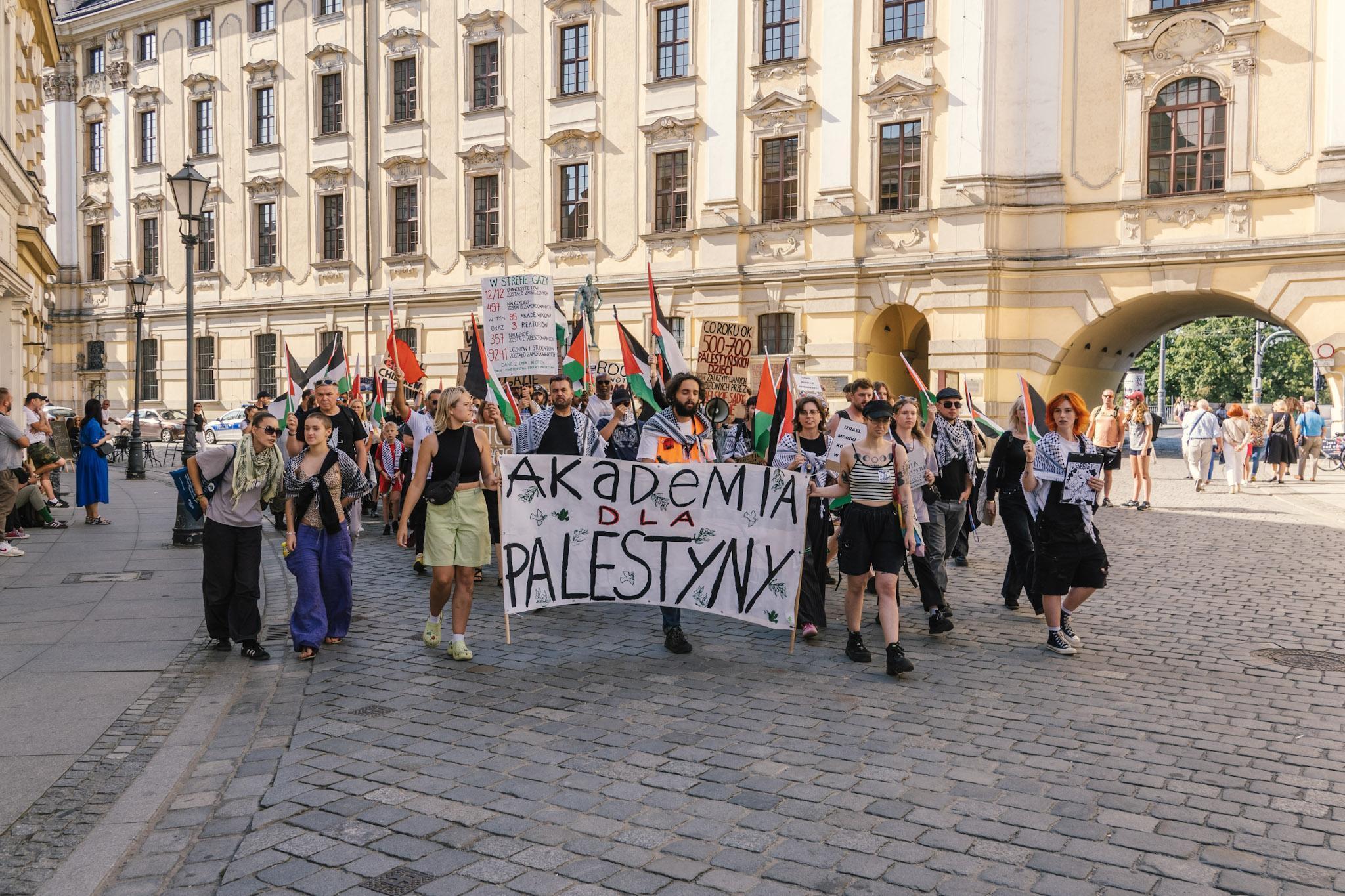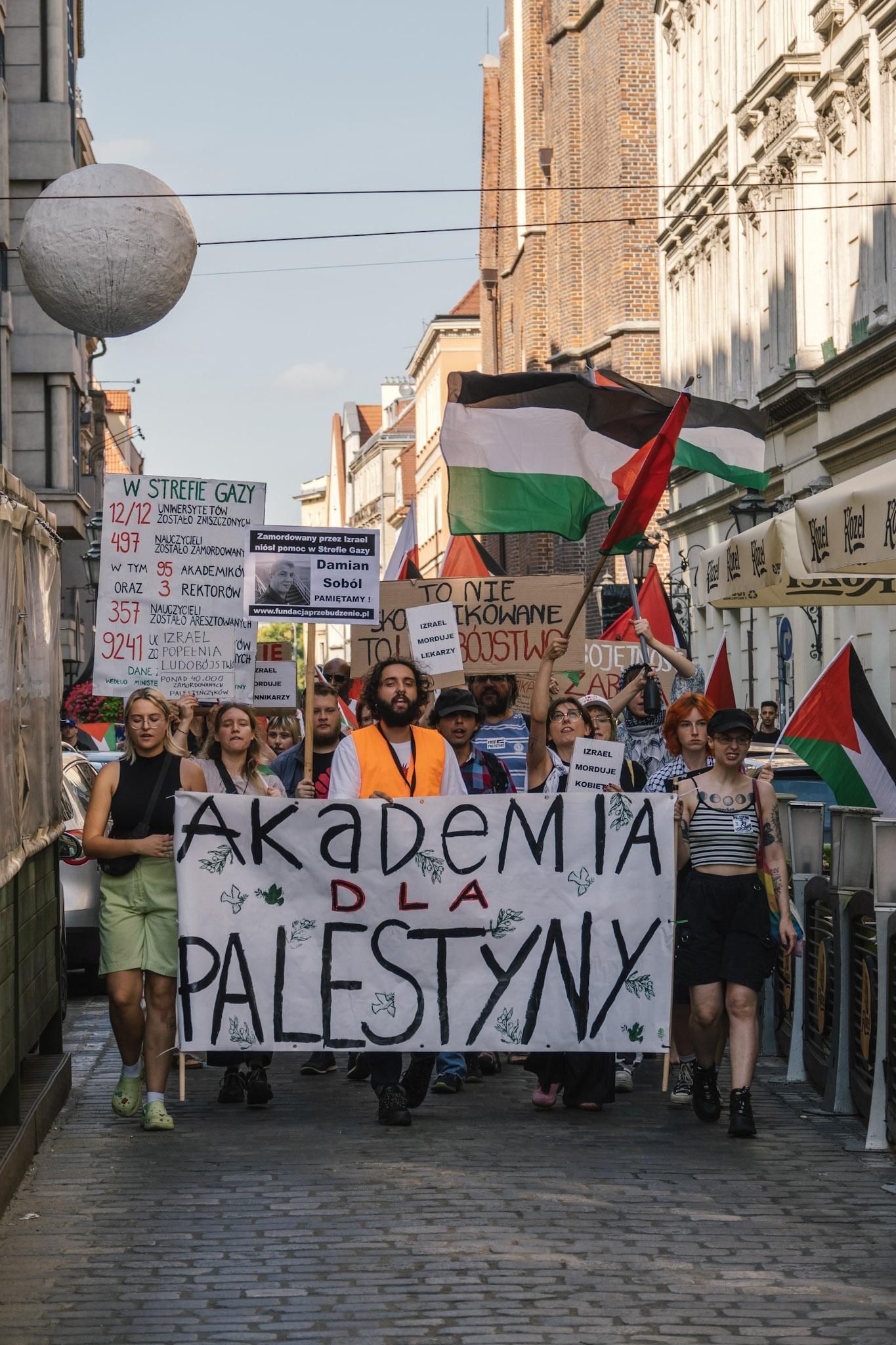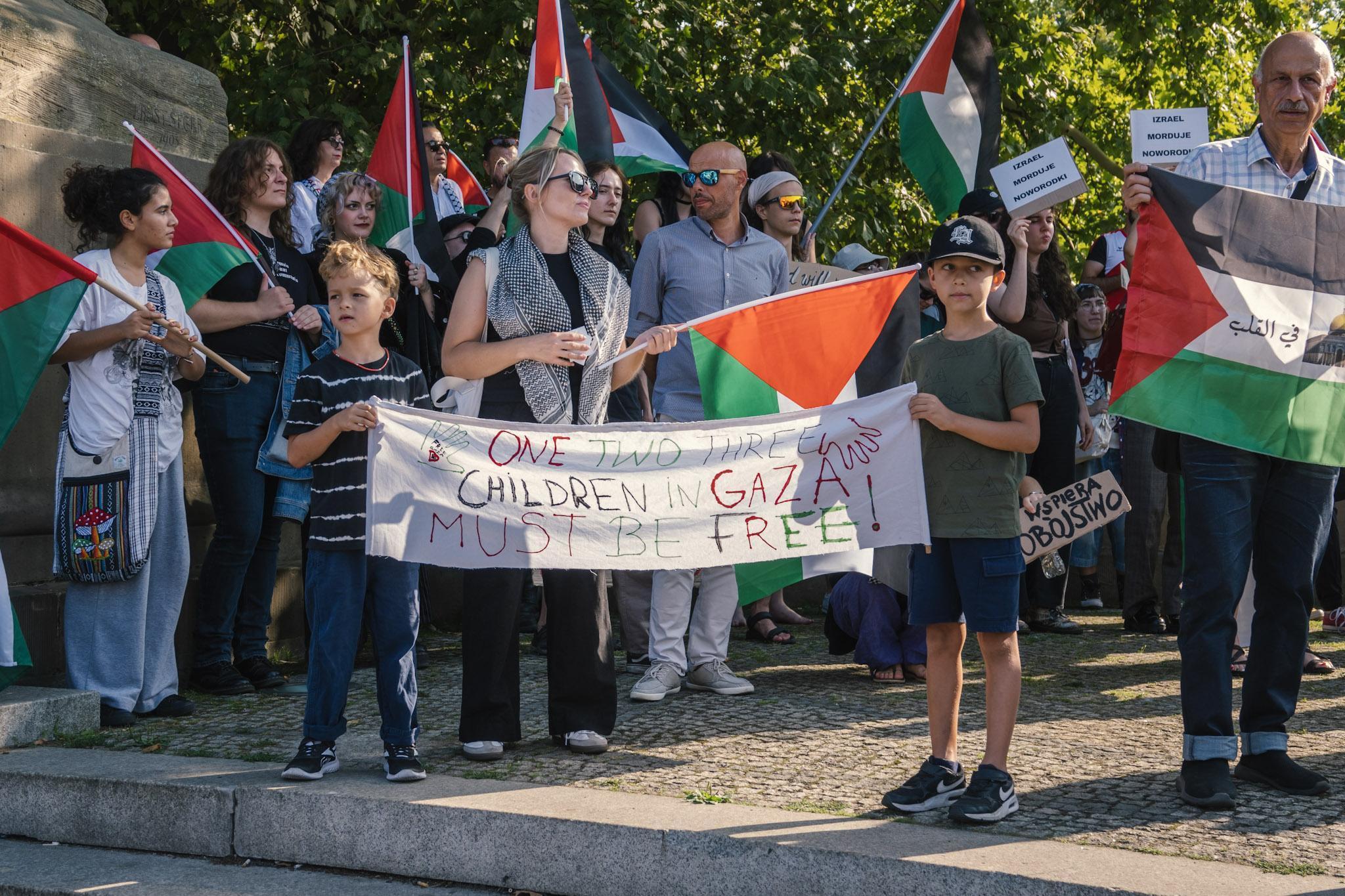The press conference focused on the public information provided by
the University regarding collaborations with Israeli academic
institutions and our subsequent actions.
Apart from the press conference, a meeting was held on the topic of
racism in Poland.
On July 19, 2024, we received a list of collaborations between the
University of Wrocław and Israeli academic institutions, research
centers, and other organizations and companies. This is
potentially the first demand we have achieved, interestingly,
without engaging in negotiations—because we requested the list
through a public information request, leaving the university no
choice but to create and share the document. The University of
Wrocław was unable to complete this within the legally stipulated
time, sending the document after extending the review period,
after 47 days.
Interestingly, it took us, the protesting students, just 13 days
to compile such a list, and on June 16, we published the related
information on our social media channels. Moreover, our notes from
that day, based on grassroots student research without access to
the university's database, are far more detailed and comprehensive
than those provided to us by the University of Wrocław. This is
mainly because, unlike the document provided by the university,
our notes contain information on the nature of the collaborations,
the projects involved, the budget, specific coordinators, and the
start and end dates of the research.
We do not understand why the university administration needed much
more time than the legally mandated two weeks to create a document
containing three sentences related to collaborations, which lack
specific information that would allow us to understand the actual
scope of the collaboration between the University of Wrocław and
Israeli institutions. In our opinion, this is yet another
expression of the university authorities' incompetence and further
evidence that the University of Wrocław's Rectorate, in our
opinion, does not take the student protest seriously. This is
mainly because we believe the document provided does not fulfill
its function of accurately detailing the scope of collaborations.
Without this, it is impossible to assess how feasible it is for
the University of Wrocław to terminate these collaborations and
what legal acts bind the agreements between our university and
Israeli institutions. Looking at the list provided by the
University of Wrocław, we wonder whether the lack of specifics is
an attempt to make it more difficult for us to prove our case—that
breaking off these collaborations is morally necessary and legally
possible.
For this reason, we would like to present what we believe a
document providing a list of collaborations between the University
of Wrocław and Israeli institutions and companies should look
like. Using examples of such documents from Leiden University and
the University of Ljubljana, we would like to present to you, and
to the University of Wrocław administration, a document that, by
gathering specific and detailed information, allows for the
beginning of substantive negotiations and discussions about
meeting our demands. We see this public presentation of
information, which the University of Wrocław chose not to disclose
in its letter, as an invitation to engage in a substantive and
factual discussion about implementing the demands we have made.
In the University of Wrocław document, we read:
In response to the public information request submitted to the
University of Wrocław on June 3, 2024, pursuant to the Act of
September 6, 2001, on Access to Public Information (Journal of
Laws of 2022, item 902), regarding the cooperation of the
University of Wrocław with Israeli academic institutions,
research centers, and other organizations and companies, I
hereby indicate that the University of Wrocław cooperates with
the following entities:
Naturally, we have no objections to this part.
The first collaboration mentioned in the document is, quoting the
University of Wrocław's response:
- The Hebrew University of Jerusalem in Israel:
-
In the field of implementing an effective combination of
medications to improve therapy against
Klebsiella pneumoniae – the bacteria causing
pneumonia.
- Cooperation in the exchange of students and staff.
In our opinion, apart from the fact that the University of
Wrocław's document lacks specific and substantive information, it
relies solely on a laconic sentence that closes off any
possibility of discussion in the context of our proposed demand to
sever cooperation with Israeli academic institutions. Therefore,
we believe the collaboration should be presented as follows:
- Collaboration with The Hebrew University of Jerusalem:
-
In the field of implementing an effective combination of
medications to improve therapy against
Klebsiella pneumoniae – the bacteria causing
pneumonia.
- Project conducted under the KLEOPATRA project.
-
Collaboration between the University of Wrocław, the
Catholic University of Leuven, Sorbonne University, the
Bundeswehr Institute of Microbiology in Germany, the German
Federal Institute for Risk Assessment, INVITRIS SME in
Germany, and The Hebrew University of Jerusalem.
- The University of Wrocław is the project coordinator.
- The project budget is €1,321,781.
- Project duration: June 1, 2023 - May 31, 2026.
-
Project funded under the Joint Programming Initiative on
Antimicrobial Resistance, which received funding under the
European Union’s Horizon 2020 research and innovation
program under grant agreements No. 681055 and 9638641.
- Cooperation in the exchange of students and staff.
Why might this cooperation raise concerns?
-
The Hebrew University of Jerusalem was involved in introducing
typhus bacteria into rivers in villages from which Palestinians
had already been expelled to prevent their return and also to
poison water sources in residential areas where the Palestinian
population still lived.2
-
The university led archaeological excavations that displaced
Palestinians, conducted on occupied Palestinian territories,
focusing on highlighting Jewish history at the expense of
concealing Palestinian history.3
-
In 2018, The Hebrew University of Jerusalem won a tender to run
an elite study program for soldiers of the Intelligence Corps as
part of their military training. Winning the tender meant
meeting increased military requirements, specifically
significant military intervention in the program's content,
structure, staff, and campus infrastructure. Students in the
program sleep, study, and eat in a dormitory designated as a
"closed military base." Few faculty members opposed the
program's launch, but Palestinian students who filmed a protest
against the program's continuation were attacked by right-wing
student groups, and the university authorities demanded the
material be removed from the internet.4
-
The Hebrew University of Jerusalem trains Shin Bet personnel—the
internal security service—responsible for implementing the
Lavender program, used by the Israeli army in Gaza to facilitate
the bombing of non-military targets and classifying specific
individuals, including independent journalists, as "force
targets," allowing for the killing of 20 to 100 civilian
casualties as "collateral damage" in strikes on these so-called
targets.5
-
The university's criminology department advertises itself as a
pioneer in "counter-terrorism" science, promoting "proven in
practice" strategies. These strategies have been condemned
internationally for violating Palestinians' rights.6
-
The university participated in the systematic and illegal
expropriation of Palestinian land as part of the national
"Judaization" policy.7
-
The Hebrew University of Jerusalem actively intimidates and
silences critical student voices.8
Returning to the University of Wrocław document, the second
mentioned cooperation is:
-
Ben-Gurion University of the Negev in Israel:
-
In the field of research on innovative nuclear receptor
particles in the fight against cancer recurrence.
-
An agreement was made to promote scientific progress through
research exchange and cooperation in teaching through the
exchange of students, lecturers, and staff, organizing joint
lectures and seminars, and research projects.
- Cooperation in the exchange of students and staff.
The lack of specifics in describing this cooperation almost makes
it impossible to create our version of the document. There is no
information on whether the mentioned agreement in the second point
is an individual agreement between universities or perhaps part of
a project like NAWA or another international project. We also do
not know if we are talking about the entire University of Wrocław
or specific units (e.g., the Institute of Mathematics or the
Department of Jewish Studies, where researchers from Ben-Gurion
University are hosted). We do not know the agreement's budget, its
nature, expiration date, or any details regarding its scope. In
our opinion, this makes it impossible to accurately understand the
legislative nature of the cooperation because we do not know which
legal acts bind and condition this cooperation.
This puts the actual fulfillment of our demand, in our opinion,
into question, as the scope of cooperation has not been presented
to us by the University of Wrocław authorities. After all, we did
not request public information from the University of Wrocław to
receive information that we could find ourselves and, indeed, have
found. We expected the university authorities to take our request
seriously and, following the example of Western universities,
create a list containing precise information that could be
translated into discussions about the ethics of the undertaken
collaborations and the necessity of potentially terminating them
in light of current events.
Nevertheless, we found much more detailed information regarding
the first mentioned collaboration with Ben-Gurion University,
which we believe should be described as follows:
-
Ben-Gurion University of the Negev in Israel:
-
In the field of research on innovative nuclear receptor
particles in the fight against cancer recurrence.
-
Project conducted under the Eradicate project, in working
group No. 1: Anticancer mechanisms of RAR and VDR ligands.
-
Collaboration between the University of Wrocław, the
University of Birmingham, and Ben-Gurion University.
-
The main coordinator of the project is the Medical
University of Vienna.
- The project budget is €2,526,933.60.
-
Project duration: January 1, 2024 - December 31, 2027.
-
Project funded by the European Union (Project Number:
101119427)9
Why might this cooperation raise concerns?
-
Ben-Gurion University has played a central role in the
"Judaization" project of the Naqab (Negev) region since the
university's founding in 1967.10
-
Ben-Gurion University closely collaborates with the military,
e.g., Ben Gurion's commercial company—BGN Technologies—conducts
joint research with Rafael, Elbit, IAI, and Lockheed-Martin, and
this collaboration is crucial for the Israeli military
industry.11
-
Ben-Gurion University supports relocating a large campus of
intelligence bases to Naqab, which will require further
expropriation of Palestinian land (including the eviction of
thousands of people).12
-
Based on a Ben-Gurion University senate resolution concerning
the "anti-Zionist bias" of some academics, lecturers expressing
their "political views" cannot mention the name of the
university they work for.13
-
Palestinian students protesting against Israeli oppression face
brutal repression.
14
Returning again to the University of Wrocław document and the last
mentioned collaboration:
-
Tel Aviv University in Israel:
- Cooperation in the exchange of students and staff.
In our opinion, the document should at least state that this
cooperation takes place within the framework of the Erasmus+
program.
The issue of traveling to Israel, apart from the ethical and
crucial doubts we have, is currently simply dangerous.
However, why might cooperation with Tel Aviv University raise
concerns?
-
The mission of the Institute for National Security Studies at
Tel Aviv University, which is affiliated with the university, is
to offer the Israeli government advice on issues critical to the
state's "national security agenda," such as creating innovative
legal interpretations that protect Israel from accountability
under international law.15
-
In 2008, Institute for National Security Studies analyst and IDF
reservist Gabi Simoni promoted a specific Israeli approach to
war, known as the Dahiya doctrine, which advocates the "use of
disproportionate force" including the destruction of "economic
assets," "civilian centers of power," and "state infrastructure"
with many civilian casualties, with the intention of achieving
long-term deterrence of the Palestinian civilian population.16
-
Tel Aviv University played a significant role in creating the
so-called Israeli "military ethical doctrine in fighting
terrorism"—part of a broader pattern of innovation in legal
doctrine, specifically designed to justify practices that
violate international humanitarian law, including practices that
led to the disproportionate use of force against Palestinian
civilians.17.
-
Tel Aviv University is transforming into a military base
according to a list of conditions set by the Ministry of
Defense. Therefore, all lecturers must comply with military
restrictions and refrain from making "offensive statements
towards IDF soldiers studying at the university."18
-
The Nano-Science and Nano-Technology Center at Tel Aviv
University collaborates on research and development with Israeli
arms companies—IAI and Elbit (Israel's largest arms
manufacturer).19
-
Tel Aviv University researchers participated in archaeological
excavations in Palestinian neighborhoods of occupied East
Jerusalem, including the Ir David site, conducted by the Jewish
settler organization Elad, whose declared mission is the
"Judaization" of Palestinian neighborhoods in East Jerusalem,
thereby undermining the Palestinian rights established by the
UN.20
Returning to the University of Wrocław's letter:
No information was found on other forms of cooperation beyond
those mentioned above during the data search procedure.
Frankly, we find it difficult to understand why the university
administration took so long to create this type of document, which
in our opinion, more closely resembles a note rather than an
actual presentation of the scope of collaborations. Moreover, we
are also concerned by the fact that the International Cooperation
Office's website lists Bar-Ilan University in Ramat Gan21
among the Partner Country universities in the Erasmus+ program for
teaching staff exchanges, in addition to the three universities
mentioned in the University of Wrocław document. Based on publicly
available data, it is difficult to determine whether the
University of Wrocław failed to disclose one of the collaborations
in response to the public information request or did not remove an
already expired collaboration from its website. However, both
situations, in our opinion, reflect the university's incompetence,
and we understand the collaborations listed on the official
website as still ongoing and therefore binding. We kindly request
the university to address this discrepancy.
However, we repeat once again, we are not here for legislative
squabbles, boasting about our knowledge and ability to find
information. The document and statement we have issued should be
seen, once again, as an attempt to initiate substantive
discussions based on concrete data, arguments, and facts. In the
current situation, we should not allow ourselves only to engage
in, what we believe to be, empty words that obviously cannot
translate into substantive discussion and real action.
Regarding these matters, we believe that our protest must expand
its activities. Constantly observing the actions of the Israeli
army in Gaza, we are increasingly horrified by the scale of the
calculated and direct targeting of educational institutions and
academic and teaching staff. To grasp the scale of the destruction
and tragedy, it is enough to say that there is no longer a
university in Gaza, no one has access to education, and final
exams in high schools have not taken place. The statistics on
casualties among rectors, scientists, teachers, students, pupils,
and preschoolers are all the more horrifying and dramatic.
Therefore, in the face of ongoing scholarly genocide, we have
decided to issue another demand, in which we call on the
University of Wrocław to support the Palestinian academic
community by:
-
Facilitating the recognition of Palestinian high school
graduation exams (Tawjihi) to enable studying at the University
of Wrocław and expanding the number of places for foreigners
with a dedicated number for candidates of Palestinian origin.
-
Creating support pathways for Palestinian students in the areas
of tuition fee waivers, providing dormitory places for arriving
students (regardless of the time of arrival in Wrocław),
establishing a financial aid system to ensure decent living
conditions, providing health insurance, and covering
international travel costs related to coming to Wrocław for
education.
-
Assisting Palestinian academic staff by creating residency
programs, organizing temporary employment opportunities at the
University of Wrocław, providing access to UWr infrastructure
for research, collaborating on research projects, and
co-organizing scientific conferences.
Funding for this support should be provided through dedicated
funds.
We hope that this approach demonstrates that our protest should
not be ignored and that discussions should begin as soon as
possible. We look forward to welcoming Palestinian students to the
University of Wrocław in October, with concrete support and the
implementation of significant solutions.
It turns out that we—the protesting students—are not the only ones
who see the necessity of starting talks with the University of
Wrocław authorities as soon as possible. This view is shared by,
among others, Janina Ochojska, Professor Magdalena Środa,
Professor Mieke Bal, Przemysław Wielgosz, Professor Dorota
Głowacka, and Professor Ariella Aisha Azoulay, who want to support
us by conducting lectures, discussions, and workshops on the
grounds of our protest. Meanwhile, Maya Wind, author of
Towers of Ivory and Steel, will support us with closed and
consultative meetings regarding negotiations. Some of the
aforementioned have signed an open letter supporting our actions
and calling on the Rector of the University of Wrocław to start
talks. The letter can still be signed, and today, right after the
conference, we will share it on our social media channels.
Thank you very much, and we encourage you to ask questions.
